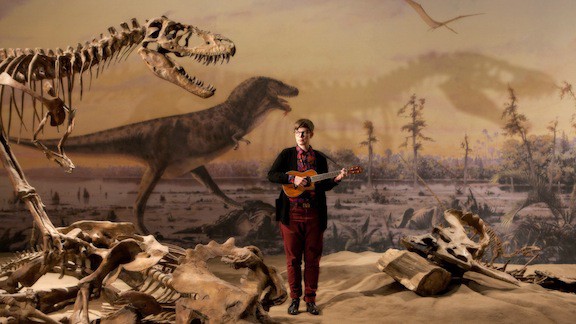Chelsea McMullan is a Canadian filmmaker and artist whose films have screened on the international festival circuit and premiered at the Toronto International Film Festival. McMullan is a member of the artist co-operative What Matters Most and was also an artist in residence at Fabrica, where she made the Genie Award-nominated documentary Derailments. My Prairie Home is her third collaboration with the National Film Board of Canada.
My Prairie Home debuts at Sundance on January 17th.
Please give us your description of the film.
My Prairie Home is a documentary-musical about the transgender indie singer Rae Spoon. It’s set in the Canadian prairies, where Rae grew up in a devoutly evangelical family. The journey home is a fairly iconic concept, so the idea of Rae returning reminded me in some ways of The Odyssey. Rae returns to the people who both love and reject them (Rae prefers the use of the gender-neutral, third-person pronoun), to an endless and complicated landscape, and to the versions of their identity that have been left behind, encountering ghosts scattered across the prairies.
What drew you to this story?
The first time I heard Rae’s music, I remember having a visceral reaction to their voice. My whole body began to tingle, and I felt a sense of nostalgia and longing. When Rae and I began collaborating, they slowly opened up and told me their story, and I realized it’s all in their music. Rae carefully wraps secrets in a sparse melodic voice. This spawned the idea not only to make a documentary but also to use Rae’s music to tell their story (hence the documentary-musical). I felt like it was an important story to tell because Rae’s history is quite unique and yet very Canadian, because they transcend gender in a way that scares people, and because we have all had the experience of feeling like an outsider at home.
What was the biggest challenge in making this film?
The biggest challenge was getting the money to make it in the first place. It took a long time to get the film financed, which required a lot of patience. Admittedly, it’s a weird pitch: “I want to make a documentary about a trans musician from Alberta told through musical numbers… and there’s going to be dinosaurs.” But Rae defies gender and I felt like the film needed to pay tribute to them by telling their story in a fittingly genre-defying way. Luckily, my producer at the National Film Board, Lea Marin, was familiar with my work and trusted me. She went to bat for it and really pushed to get it made. Without her there would be no film, I’m sure of that.
What advice do you have for other female directors?
My advice would be to not perceive yourself as a female director and not let anyone treat you like one. I have a “no teacher voice” policy with male crew on set, devised from necessity. Though I have to say I used to try and not use gender to my advantage, like the fact that certain people didn’t take me seriously ’cause I was a young woman wielding a camera, for example, but at a certain point I said, “Fuck it.” I think I get a lot of unprecedented access as a documentary filmmaker because people don’t perceive me as threatening. And to be honest, even though it’s totally motivated by sexism and probably ageism as well, I still smile and walk on by them with my camera.
What’s the biggest misconception of your work?
The word “whimsical” doesn’t make sense to me. It’s a word that’s generally thrown around too often and incorrectly. As it relates to my work, it’s an oversimplification. Since we are on the topic of gender, how often does anyone hear “whimsical” being tied to films directed by men?
Do you have any thoughts on what are the biggest challenges and/or opportunities for the future with the changing distribution mechanisms for film?
As a young filmmaker, I need to look at things optimistically and embrace change. It’s sad to me that people aren’t going to see films in beautiful old theaters any more, and I do still love a 35mm print. On the other hand, all kinds of films are at our fingertips in a way that, as a teenager growing up in suburbs, I never had access too. Obscure films being available and accessible means we can create more sophisticated audiences with a craving for more challenging material. I think we are still figuring out as artists how to monetize this, but the indie music scene is a good blueprint to follow. It involves filmmakers interacting with their audiences and being more present. I also think crowd-sourcing screenings is the future. I think a company like Tugg is leading the way in new approaches to distribution.
Name your favorite woman-directed film and why.
Undoubtedly Claire Denis’ Beau Travail. I know I’ve seen a great film when I’m truly jealous that I didn’t make it. I have never felt more jealous than when I saw Beau Travail (it’s a good kind of jealous, not the creepy kind — the kind that makes you aspire to be better — the productive kind). I think the way she is able to deconstruct race and gender with such subtlety in that film is an incredible achievement. It’s equally the most restrained and campiest film I’ve ever seen.






